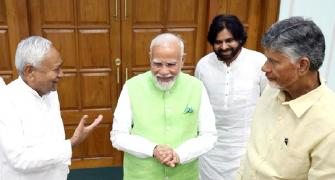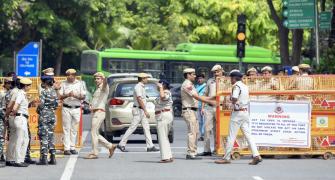
Addressing a meeting called by the government with the private sector to discuss the "Make in India" initiative, Finance Minister Arun Jaitley sounded some very welcome notes.
In effect, he made it clear that the government understood that giving India a competitive edge was central to the success of the programme, which intends to create jobs in India through reviving its manufacturing sector.
Budget season is on the horizon, in which the finance minister and his officials will meet various stakeholders and brainstorm as to how best to have the next Union Budget meet sky-high expectations.
The ideas that Mr Jaitley is taking into that process bode well for what is likely to emerge.
Mr Jaitley called on various organs of government to help business grow.
He said that co-ordination between ministries and between the Centre and states will improve - but added that other organs of government should also look at improving governance, and mentioned judicial institutions in particular.
To ensure the growth of competitiveness in the Indian economy, he specifically indicated that further changes in labour law would be considered - the changes so far are mainly cosmetic - and also said that barriers to entry in the manufacturing sector were too high.
This is true. India needs a more dynamic private sector - one in which both capital and labour can flow more easily from one project to another.
For the first, barriers to entry need to be relaxed and bankruptcy law must be improved. And for the second, more flexible labour law is the answer.
Given that Mr Jaitley will be writing the next Budget, his thoughts on taxation were given special attention.
He insisted that the tax regime should meet global standards.
He framed this as necessary to ensure that Indian companies kept their costs under control : "Unless our taxation regime is internationally compatible, the cost of our products is going to be more."
This is perhaps the first time that anyone in the government has made an explicit statement about tax policy and coming as it did after some industry representatives demanded higher duties to protect Indian manufacturers, the minister's overall approach is a welcome relief.
Indeed there was much in Mr Jaitley's speech that served as a sensible vision for the future.
One of the most encouraging things was the location where the minister made these statements.
The government's seminar with industry is a positive change - the last few years of the last government, led by the United Progressive Alliance, featured a crippling fear of industry, because of the accusations of cronyism and of corruption that had already built critical mass.
This fear of interaction had enhanced the perception of paralysis and helped cause investment to freeze.
Going to work to reverse that has been one of this new government's first tasks, and it has done this well. A more transparent and effective industry-government partnership is essential to move forward the agenda Mr Jaitley outlined.










